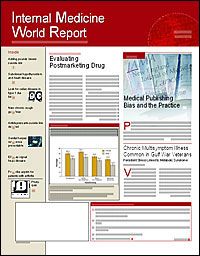Publication
Article
Internal Medicine World Report
Subclinical Hypothyroidism and Heart Disease Link Strengthened
Author(s):
The controversial link between subclinical hypothyroidism (SH) and cardiovascular (CV) disease has been strengthened, but not established, with the results of 2 recent studies.
The first study (Arch Intern Med. 2005;165:2460-2466) examined a community-based cohort of 2730 men and women in their 70s. Multivariate analysis demonstrated that the higher the thyroid-stimulating hormone (TSH) level, the more likely a con?gestive heart failure (CHF) event (P = .03 for trend) at 4 years' follow-up (Table).
Of the 2555 persons without CHF at baseline, those with moderate or severe SH (ie, TSH, >=7 mIU/L) had more than double the risk of a first CHF event than those who were euthyroid (P = .03).
This relationship remained after controlling for CV risk factors. However, lead investigator Nicolas Rodondi, MD, MAS, of the University of California, San Francisco, and colleagues "found no consistent evidence that SH was associated with CHD [coronary heart disease] events, stroke, cardiovascular-related mortality, or total mortality."
A "split verdict" was also reached in the second study (Arch Intern Med. 2005;165:2467-2472), which analyzed 2108 archived serum samples from about an equal number of men and women (mean age, 50 years).
Cross-sectional analysis showed that individuals with SH were almost twice as likely to have developed CHD by the year 2001 than their euthyroid counterparts (P = .04). The association retained its significance after controlling for CV risk factors.
However, when participants with SH were bifurcated into groups with TSH values 10 mIU/L or >10 mIU/L, the association with CHD remained significant only in the latter group.
And a longitudinal analysis of the 1926 adults without CHD at baseline showed that those with SH were at higher risk for CHD events (P <.01).
Lawrence M. Crapo, MD, of Santa Clara Valley Medical Center, San Jose, Calif, comments in an accompanying ?editorial (pages 2451-2452) that this topic is important because both SH and CV disease are prevalent, especially with increasing age, adding that some CV disorders may increase in patients with SH, especially in those with TSH levels >10 mIU/L. Establishing an ?association be?tween the degree of SH and the risk of CV events would help determine when therapy is warranted.
"The data in these studies would certainly support the idea that the treatment of severe SH with levothyroxine in patients younger than 80 years may be beneficial, but this remains to be proved in a randomized prospective therapeutic trial," Dr Crapo writes.





